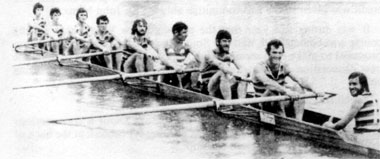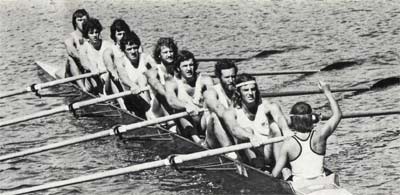Adelaide Rowing Club - The First Hundred Years
A Narrative History 1882-1982 - Compiled by R W Richardson
Table of Contents
Chapters
- Introduction
- I Zingari: The Origin of the Club
- Narrative History of ARC: 1882-1887
- 1887-1892
- 1892-1897
- 1897-1902
- 1902-1907
- 1907-1912
- 1912-1922
- 1922-1927
- 1927-1932
- 1932-1937
- 1937-1942
- 1942-1947
- 1947-1952
- 1952-1957
- 1957-1962
- 1962-1967
- 1967-1972
- 1972-1977
- 1977-1982
- Early Days of Rowing on the Murray
- Memoirs of my Association with the ARC and Rowing Men
- ARC's Famous Coxswains Over the Years
- Get Fit for Autumn—How to do it
- Notable ARC Coaches
- ARC at War
- Pity the Poor Hon. Secretary!
Appendices
20. Narrative History of the Adelaide Rowing Club - 1972-1977
Chapter twenty page 1 2
Season 1972-73
Willie Hay followed Harold D'Arcy as Captain, and his efforts were totally devoted to rowing, by producing senior oarsmen and some dedicated to the extent of aspiring to compete interstate and internationally. He continued as Captain for two years, with remarkable success, but without winning a Premiership; and found the finances fall into disarray.
Now that the Club had re-established itself, the summary of its achievements and a statement of its aspirations were expressed in the report written by Willie Hay - "The past twelve months, as expected, proved to be a difficult period for the Club. The Committee was faced with a rebuilding programme and what appeared to be a difficulty in boating a Senior 8, amongst other things. These two major problems were compounded by the fact that active oarsmen form a large part of the Committee, and so the abnormally high degree of work required in the clubhouse made success in rowing much more difficult".
Fortunately some of the older members responded to the challenge and, had it not been for Charlie Amiel, Bob Richardson and Don Sarah, it is doubtful if the improvements would have been completed. This crisis also gave rise to the formation of the Vice-Presidents' committee under Colin Runge, to raise money by selling wine and running raffles etc. to pay off the building debt.
The 1973 King's Cup Regatta was held at Murray Bridge. Two Adelaide Rowing Club oarsmen were included in the State squads. Athol MacDonald was selected for the eight, and Bill Whiting was named as reserve for the lightweight four. This regatta was a great success, and credit was given to the sub-committee ably led by John Menz.
It was during this year that the proposed new West Lakes rowing course was commenced, and the South Australian Rowing Association proposed to make each member club responsible to assist in funding the new Association shed on the banks of the new International rowing course.
Adelaides came third in the Premiership this season.
An amusing anecdote is told by Klaas Buys about a conscientious Chief Fire Officer and a few members burning off rubbish at the back of the boathouse after a winter's cleanup:
"With the passing of time, the boatshed gains a collection of items remotely related to rowing, such as empty beer cartons, pieces of old timber, smelly rags and all sorts of bric-a-brac, requiring a working bee to clear it out.
On one such occasion the pile of rubbish removed from the shed was even larger than usual, so it was decided that the quickest way to get rid of it was to set it alight. Within seconds a huge bonfire lit up the dark wintry night at the back of the boathouse, to the delight of the workers, but their joy was shortlived, because minutes later the howling siren of a fire engine approached the Club. To show that all was perfectly under control, a garden hose was quickly put through a window, from which a tiny trickle of water was played onto the fire. The fire crew meant business, however, and the blaze was put out in a fraction of time.
This was not all, alas. In the next breath a uniformed figure emerged from the dark, imposingly decorated with gold braid on cap and sleeves. Slowly and sternly producing a notebook, he turned to the nearest Club member and said,
"Are you on the committee, sir?" "Well, yes, I suppose so".
"And what would your position be?" "I am the auditor".
At this stage the enquirer looked a bit non-plussed and said, "I beg your pardon?"
"I am the auditor."
During the silence which followed it became apparent that were not a well known breed in fire circles, so that spelling familiar name posed an unexpected problem, requiring quick lest prestige be lost.
"Give us a different function," said the Chief."
K. Buys
(Pat Hill the Auditor)
Season 1973-74
By early 1974 the careful planning of the previous several years was starting to show results, and Adelaides made four visits to Victoria during this season. The first trip was to Melbourne, where both the Senior 4 and the Junior 4 competed on the Yarra. The Senior 4 ran a close second to Monash, with the Junior 4 drawing their heat, which eventually resulted in a row over. Corio Bay was the venue for the second confrontation with the Victorians, where both crews were defeated. The Victorian championship in Senior 4's at Ballarat was a magnificent race, with our Senior crew finishing only half a length down to a stronger and more experienced Melbourne University Boat Club crew in the final. The Senior 4 won the South Australian championships for Senior 4's at Murray Bridge by fighting off a very determined effort by the Adelaide University Boat Club.
The Club was then in a position to boat a good Senior 8 but, as the Torrens Rowing Club was unable to boat a Senior 8, Adelaides decided to invite Bill Dankbaar, who had then recently returned from his trip to Moscow with the Australian 4, to row with the Club under his Torrens Colours. The primary reasons for his inclusion were firstly to keep him racing, secondly to give the Club a better chance of winning the Victorian Senior 8's Championships, and lastly to help raise the standard of eight oared racing in our own State, with the ultimate aim of producing a faster State 8. Our composite 8 made history in Victoria by clinching their first Championship Senior 8's race by half a length at Ballarat. Following a six hour delay due to foul weather, the Senior 8 beat the Adelaide University Boat Club at Port Adelaide in their own State Senior 8's Championships. These victories resulted in the inclusion of seven members of the Club in the State King's Cup Squad. The members of the 26th January 1974 Champ Senior 8 crew were Matthew Marquis, Henry Duncan, Russell Prescott, Athol MacDonald, Mark Hebblewhite, Bill Dankbaar (T.R.C.), Mike Lohmeyer, Willie Hay (Stroke) and Tony Goldsworthy (Cox).

Champion 8, 1974
M. Marquis, bow, H. Duncan, 2, R. Prescott, 3, A. Macdonald,
4, M. Hebblewhite, S, W. Dankbaar, 6 (T.R.C.), M. Lohmeyer, 7, W. Hay, str., A. Goldsworthy, cox.
All these successes resulted in a great surge of enthusiasm and the formation in late winter of training squads for Under 19's, Lightweights and Maidens. The Club's tail was well up. By now some real talent was evident in rowing ranks, and the winners of the Club trophies were all outstanding performers. Henry Duncan, in his first year out of school, had rowed in the winning Champion Senior 8 and also rowed in the State 8 in the King's Cup. His record made him an automatic choice for the Captain's Trophy for the best 1st year oarsman.

1974 SA King's Cup Crew
Mark Hebblewhite won the J.J. Sharp trophy for the most improved oarsman, Matthew Marquis won the C.A.M. West shield for the greatest number of wins for the season, and Tony Goldsworthy won the Charles Morgan trophy for the man showing most ability and general qualities, as well as the Ken Milne Trophy for the best coxswain.
Strangely, after all the distance covered by road and on water, and the Interstate contests won and narrowly lost, the Club managed to win but 10 races at S.A.R.A. regattas.
The finances were in disarray, with a $2,000 loss on social functions and a miserable $56 profit by the Bar Committee. Clearly a hard look had to be taken at maintaining a balance between glamour and reality.
One of the factors causing this failure to raise funds at social functions was the clamp put on by the Licensing Court through the Club's failure to meet all their detailed standards.
